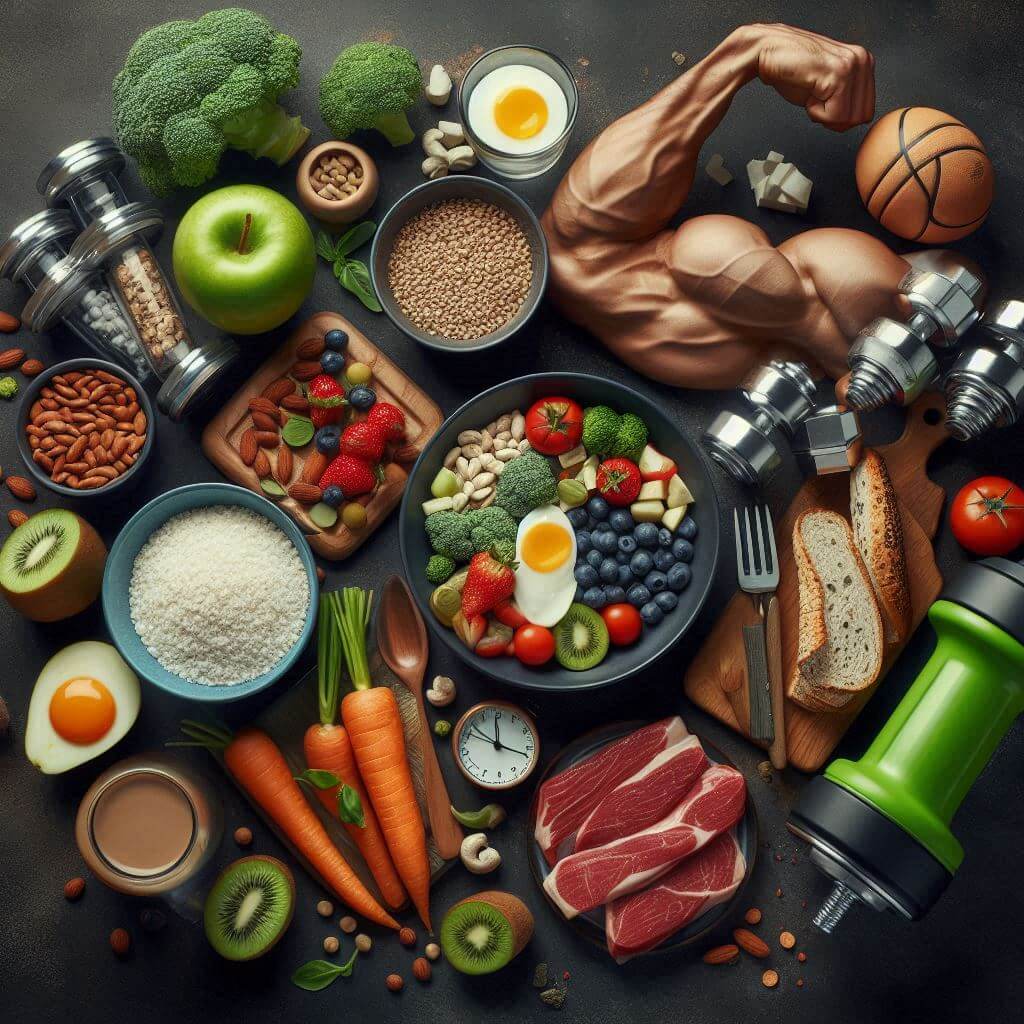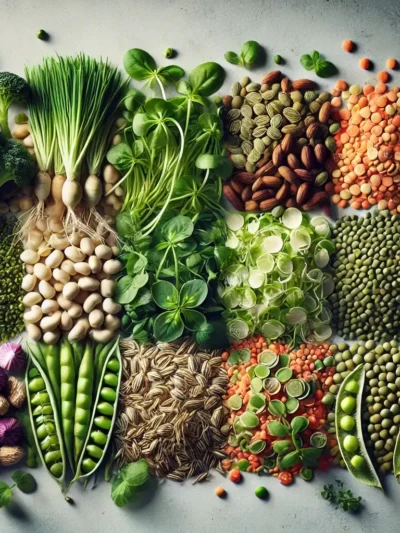The Fitness Journey: Beyond Training, Post-Workout Meals Are Key to Success
Although sweat and dedication to training are essential, the fitness journey is not just about physical effort.
To achieve your goals and enjoy the benefits of exercise, post-workout nutrition plays a crucial role in muscle recovery, optimizing results and achieving a strong, healthy body.
The Post-Workout Window of Opportunity: Seizing the Ideal Time for Recovery
After an intense workout, your body enters a crucial recovery state. Energy stores, such as muscle glycogen, are depleted and your muscles are receptive to absorbing nutrients to replenish and rebuild themselves.
This “window of opportunity,” usually 30 to 60 minutes after exercise, is critical to providing the body with the essential elements for muscle repair and growth.
Essential Macronutrients: Fueling Your Muscles for Growth
To make the most of this window of opportunity and boost your recovery, it is essential to consume the essential macronutrients in the appropriate proportions:
- Proteins: These are the building blocks of muscle, responsible for the repair and growth of muscle fibers. Choose lean, high-quality sources such as chicken, fish, eggs, legumes, and plant-based protein powder.
- Carbohydrates: Replenish muscle glycogen reserves, the main source of energy during training. Choose complex carbohydrates from low glycemic index, such as brown rice, sweet potatoes, quinoa, fruits and oats, to ensure sustained energy and avoid insulin spikes.
- Examples:
- Baked sweet potatoes with olive oil and herbs
- Brown rice with shredded chicken and vegetables
- Quinoa with chickpeas and tomato salad
- Whole wheat bread sandwich with peanut butter and banana
- Oatmeal pancake with fruit and honey
- Examples:
- Healthy Fats: They provide additional energy, aid in the absorption of fat-soluble vitamins and contribute to cardiovascular health. Avocado, olive oil, nuts and seeds are excellent options to include in your post-workout meals.
- Examples:
- Green salad with olive oil and balsamic vinaigrette
- Avocado with boiled egg and tomato
- Chestnuts and almonds as a snack
- Grilled salmon with herb oil
- Protein smoothie with chia and flaxseed
- Examples:

Delicious and Nutritious Suggestions: Post-Workout Meals You'll Love
To make your post-workout recovery even tastier and more practical, check out some suggestions for delicious and nutritious meals:
Quick and Practical Options:
- Protein Smoothie: A practical and refreshing combination, ideal for those who are short on time. Combine protein powder, banana, strawberries, plant-based milk and a spoonful of chia for a smoothie rich in protein, carbohydrates and fiber.
- Egg White Omelette: A light, protein-rich option that’s perfect for breakfast or a post-workout snack. Add spinach, mushrooms, tomatoes, and other veggies for a nutritious and flavorful twist.
Complete and Nutritious Meals:
- Grilled Chicken with Sweet Potato: A classic and delicious combination, providing lean protein and complex carbohydrates for a complete recovery. Season the chicken with herbs and spices to taste and serve with baked or steamed sweet potatoes.
- Quinoa Salad with Salmon: A complete and nutritious meal, rich in protein, fiber and omega-3 fatty acids. Cook the quinoa according to the package instructions, season with olive oil, lemon and fresh herbs, and add grilled salmon, tomatoes, cucumber and other vegetables of your choice.
Practical Tips to Maximize Your Post-Workout Results
In addition to choosing the right foods, some practical tips can help you optimize your recovery and enhance the results of your workout:
Planning is Essential
- Prepare your meals in advance: Having your post-workout meal ready can prevent impulsive choices and ensure you consume the necessary nutrients within the window of opportunity.
- Choose foods that are easy to digest: Choose foods that are quickly absorbed by the body to speed up recovery.
Balance is Key
- Combine proteins, carbohydrates and fats healthy: The three macronutrients work synergistically to promote muscle recovery and energy replenishment.
- Consider your individual needs: The ideal amount of each macronutrient can vary depending on your goals, level of physical activity and personal characteristics.
Essential Hydration
- Drink water before, during and after training: Proper hydration is essential to prevent dehydration and optimize physical performance.
- Consider sports drinks: To replace electrolytes lost during intense sweating, sports drinks can be an option.
Avoid Excesses
- Moderate your sugar intake: While carbohydrates are important, avoid foods high in added sugar, as they can cause insulin spikes and impair recovery.
- Beware of excessive portions: Consuming too much food, even if it is healthy, can overload the digestive system and interfere with recovery.
Listen to Your Body
- Try different foods: Discover which foods work best for you and how your body responds to different nutritional combinations.
- Adapt your food as needed: As your goals and activity level change, adjust your post-workout nutrition to meet new demands.
Supplements: A Complement, Not a Substitute
- Consider supplements in moderation: Supplements can be useful to complement a balanced diet, but they should not replace real food.
- Opt for quality supplements: If you decide to use supplements, choose products from trusted brands with scientific backing.
Several studies show that post-workout meals contribute to faster muscle recovery, reducing fatigue and improving performance in subsequent workouts.
- Examples:
Remember: Post-workout nutrition is just one piece of the puzzle to achieving your fitness goals. Combine a balanced diet with exercises regular exercise, adequate rest and stress management to achieve lasting results and a healthier life.
Want to explore a specific topic related to post-workout nutrition?
Benefits of Post-Workout Meals: Boosting Your Recovery and Performance

Investing in proper post-workout nutrition not only speeds up muscle recovery, but also offers a host of benefits that boost your performance and overall health.
Energy and Essential Nutrient Replacement
- Muscle glycogen replenishment: Carbohydrates provide the energy needed to rebuild glycogen stores, ensuring you're ready for your next workout.
- Tissue repair: Proteins are essential for protein synthesis, which is essential for repairing muscle fibers damaged during exercise.
- Electrolyte balance: Replenishing minerals such as sodium, potassium and magnesium is crucial to maintaining hydration and proper muscle function.
Enhancement of Muscle Growth
- Increased protein synthesis: Consuming protein post-workout stimulates the construction of new muscle fibers, leading to a gradual increase in muscle mass.
- Prevention of catabolism: Adequate nutrient intake helps prevent muscle breakdown, preserving hard-earned muscle tissue.
Performance Improvement
- Fatigue reduction: Proper replacement of energy and nutrients contributes to faster recovery, reducing the feeling of fatigue and allowing you to train with greater intensity in subsequent sessions.
- Increased resistance: Proper post-workout nutrition can improve your body's ability to handle the stress of exercise, increasing your endurance and resistance to fatigue.
Strengthening the Immune System
- Nutritional support: A balanced diet, including fruits, vegetables and proteins, provides essential nutrients to strengthen the immune system, protecting the body against infections.
General Health
- Weight control: Balanced post-workout meals can help control appetite and prevent binge eating, helping you maintain a healthy weight.
- Bone health: An adequate intake of calcium and vitamin D, found in some foods, is essential for bone health, especially for women.
Scientific evidence suggests that proper post-workout nutrition, including protein, carbohydrates and healthy fats, helps strengthen the immune system, protecting the body against infections.
In summary, Post-workout meals are a key part of optimizing your fitness results. By providing the nutrients needed for recovery, muscle building, and energy replenishment, these meals play a crucial role in your journey to achieving your health and fitness goals.
Would you like to explore any of these benefits in more detail or discuss specific strategies for maximizing your post-workout results?
FAQ – Post-Workout Meals: Get Your Questions Answered and Boost Your Results

1. What are the main benefits of eating after training?
Post-workout meals are essential for:
- Replenish energy and nutrients: Replenish muscle glycogen stores and provide nutrients for tissue repair and muscle growth.
- Avoid catabolism: Prevent the breakdown of muscle tissue to obtain energy, preserving hard-earned muscle mass.
- Optimize recovery: Accelerate the muscle recovery process, reducing fatigue and allowing you to train more intensely in future sessions.
- Improve performance: Increase endurance, strength and the body's ability to handle the stress of exercise.
- Strengthen the immune system: Provide the nutrients needed for a strong and healthy immune system.
2. What should I eat after training?
Post-workout meals should consist of a combination of:
- Proteins: Lean sources such as chicken, fish, eggs, legumes or plant-based protein powder are ideal for aiding muscle repair and growth.
- Carbohydrates: Opt for low-glycemic complex carbohydrates, such as brown rice, sweet potatoes, quinoa, fruits and oats, to ensure sustained energy and avoid insulin spikes.
- Healthy fats: Avocado, olive oil, nuts and seeds provide additional energy, aid in the absorption of vitamins and contribute to cardiovascular health.
3. What is the ideal amount of nutrients to consume after training?
The ideal amount of each macronutrient varies according to:
- Your goals: Individuals looking to gain muscle mass may need more protein than those just looking to stay in shape.
- Physical activity level: People who train more intensely and frequently may have greater nutritional needs.
- Weight and height: Larger individuals generally require more calories and nutrients.
4. How long after training should I eat?
It is crucial to consume the nutrients within post-workout window of opportunity, usually between 30 and 60 minutes after exercise. During this period, the body is more receptive to absorbing nutrients for muscle recovery.
5. What if I can't eat right after training?
If it is not possible to eat immediately after training,opt for a light and nutritious snack to ensure the initial supply of nutrients. Some options include:
- Fruit with Greek yogurt: A combination rich in proteins, carbohydrates and fiber.
- Protein shake: A practical way to consume fast-absorbing proteins.
- Mix of nuts and dried fruits: Source of protein, healthy fats and energy.
6. What foods should I avoid after training?
It is recommended avoid processed foods, high in sugar and saturated fats, as they can impair the absorption of essential nutrients and delay muscle recovery.
7. Is it important to drink water after training?
Yes, the hydration is essential before, during and after training to replace fluids lost through sweat and keep the body functioning properly.
8. Should I take nutritional supplements after training?
Supplements can be useful to complement the diet, but should not replace a balanced diet. Consult a nutritionist to assess whether supplements are right for you and which types are most recommended.
9. What tips can I follow to optimize my post-workout meals?
- Plan your meals in advance: Prepare your meals or snacks in advance to avoid impulsive choices and ensure you consume the necessary nutrients within the window of opportunity.
- Choose foods that are easy to digest: Prioritize foods that are quickly absorbed by the body to speed up recovery.
- Combine proteins, carbohydrates and healthy fats: The three macronutrients work synergistically to promote muscle recovery and energy replenishment.
- Consider your individual needs: Adjust the amount of each macronutrient according to your goals, level of physical activity and personal characteristics.
- Listen to your body: Experiment with different foods and combinations to find what works best for you and how your body responds to each option.
10. Which protein-rich foods are recommended for consumption after training?
Protein is essential for muscle recovery after training. Here are some great options:
- Lean meats: Chicken, turkey, fish (salmon, tuna, cod), lean red meat (filet mignon, sirloin)
- Eggs: Complete source of protein, rich in essential amino acids.
- Milk and dairy products: Greek yogurt, cottage cheese, ricotta (low-fat options)
- Legumes: Beans, lentils, chickpeas, peas, tofu
- Nuts and seeds: Almonds, chestnuts, chia, flaxseed
- Plant protein powder: Practical and convenient option for those looking for a quick source of protein.
Remember: The combination of proteins and carbohydrates is ideal for complete recovery.
Want to learn more about how to combine protein with other nutrients in a post-workout meal?









